Why the Alaska Summit 2025 failed
The Alaska summit between Donald Trump and Vladimir Putin concluded on 15 August, exactly as seasoned observers had predicted: with grand pronouncements of “progress” but no tangible peace. This diplomatic theatre masks an uncomfortable reality. After three years, 350,000 military deaths, and $2.7 trillion in global military spending, the Ukraine war persists not despite international efforts but because of them. When defence contractors’ profits soar and energy markets reward the nimble, peace becomes an economically irrational choice.
This is not mere cynicism but an observable fact. Global military expenditure in 2024 increased by 9.4%, the sharpest rise since the end of the Cold War. American defence giants saw remarkable gains, with Northrop Grumman’s stock climbing 37%, General Dynamics 26%, and Lockheed Martin seeing a 24% increase. Each Patriot missile interceptor costs $4 million; America alone has furnished $66.9 billion in military aid. War, it seems, has rarely been better for business.
Conflict at the Ukrainian-Russian border has deep roots in the post-Cold War settlement’s failures. When the Soviet Union collapsed, victorious Western powers expanded NATO eastward without integrating Russia into a new security architecture. Analysts note that expansion was “primarily driven by Central and Eastern European states seeking security guarantees.” Yet dis-

missing Russian concerns as paranoia has proved catastrophically shortsighted.
The parallel to the Treaty of Versailles merits a worthy consideration, as the unjust peace settlement plants seeds for future conflicts. The 1994 Budapest Memorandum exemplifies this pattern – Ukraine surrendered the world’s third-largest nuclear arsenal for security guarantees that proved worthless when Russia annexed Crimea in 2014. Promises broken become grievances nursed, eventually erupting into violence.
If we consider the economics of wars, the motive of profitability becomes very clear. Russia now devotes 6% of its GDP to defence, employing 3.8 million citizens
in arms production. Ukraine has become the world’s largest weapons importer, with purchases increasing nearly 100-fold since 2019. Western defence contractors maintain order backlogs worth hundreds of billions. Lockheed Martin alone sits on $173 billion in future contracts while planning $18 billion in dividends and buybacks through 2027.
These figures reveal a self-reinforcing system where continuation serves more interests than cessation. The Holy Quran’s observation that “And when it is said to them: ‘Create not disorder on the earth,’
Parable of the one who memorises the Holy Quran and then retains it
Hazrat Ibn ‘Umarra narrated: “Allah’s Messengersa said, ‘The likeness of the one who has memorised the Quran is that of a man with camels that are tethered: if he keeps up his care for them, he retains them; but if he lets them go, they slip away.’”
(Sahih al-Bukhari, Kitab fada’ili l-qur’an, Bab istidhkari l-qur’ani wa ta‘ahudih, Hadith 5031)
Hazrat Mirza Ghulam Ahmadas, In His Own Words
The miracles of the other Prophets
The Promised Messiahas said: “The signs that Mosesas and the other Prophets showed to the world, like
22 August
22 August 1923: On this day, an English newspaper, the Times of Ceylon, published the proceedings of the Colombo Ahmadiyya Jamaat’s meeting. To learn more about this, see: “100 Years Ago… – Ahmadi missionaries enter Ceylon” at alhakam.org (15 September 2023, p. 21).
22 August 1924: During his 1924 tour of Europe, on this day, Hazrat Musleh-e-Maudra reached London’s Victoria Station, where

This Week in History
A glimpse into the rich history of the Ahmadiyya Muslim Jamaat 22 - 28 August
murder levelled by a prominent Christian missionary, Henry Martyn Clarke. Huzooras was present in court when the verdict was announced. (Tarikh-e-Ahmadiyyat Vol. 1, p. 633)
23 August 1980: During his tour of Africa, on this day, Hazrat Khalifatul Masih IIIrh met with Nigerian Ahmadis in Lagos. On the same day, the Federal Minister of Education of Nigeria and the adviser to the Emir of Kano State also came to meet Huzoorrh. (Al Fazl Rabwah, 4 September 1980, p. 8)

alislam.org
24 August 2007: During his Friday Sermon on this day in the Netherlands, Hazrat Khalifatul Masih Vaa addressed the statement of Geert Wilders against Islam, the Holy Quran and the blessed character of the Holy Prophetsa. Huzooraa had answered various of Mr Wilders’ allegations against Islam on various occasions.
the local Jalsa of Jamaat Asnoor in Kashmir. The total attendance was around 500. Huzoor’sra lecture lasted for four and a half hours. (Tarikh-e-Ahmadiyyat, Vol. 4, p. 284)
26 August 1988: On this day, Hazrat Khalifatul Masih IVrh began his tour to East Africa, which was the first ever visit to East Africa by any Khalifatul Masih. (Silsila Ahmadiyya, Part 4, p. 849)



he was received by Ahmadis. On this occasion, Huzoor everyone in a silent prayer. (Tarikhe-Ahmadiyyat, Vol. 4, p. 446)


On this day,


guilty. The judge dismissed the charges of attempted

23 August 1903: Count Lev Nikolayevich Tolstoy, usually
a Russian writer, wrote to Hazrat Mufti Muhammad Sadiq
On this day, Count referred to in English as Leo Tolstoy,

regarded as one of the greatest and
most influential authors of all time.

To read the background of this correspondence, see: “Tolstoy and met a Messiah” at alhakam.org (6 September 2024, pp. 3-7).






The Promised Sitara-e-Qaisariya
(Star of the Empress in Zia-ul-Islam Press, Qadian, on this day. The Promised Messiah
Ahmadiyya: How Messianic ambition

To understand this whole debate, see: “Recalling Huzoor’s words amid Geert Wilders’ ‘victory’ in Dutch elections” at alhakam.org (23 November 2023, p. 13).

25 August







25 August 1920: On this day, Eid-ul-Adha was celebrated in Mauritius on Wednesday. Ahmadis offered Eid at Rose Hill Mosque. Non-Ahmadis filed lawsuits and spent huge sums of money to get hold of this mosque.





27 August 1946: On this day, Al Fazl published Hazrat Muslehe-Maud’sra call to the Muslim world to support the freedom movement of Indonesia. Huzoorra stated that there were around 70 million Muslims in Indonesia, who belonged to one nation, spoke a common language, and had a desire for unity as well.
To read more on this, see: Jamaate-Ahmadiyya’s role in Indonesia’s independence from the Dutch” alhakam.org (24 December 2021, pp. 26-28).
28 August

To read more about these series of events, see: “100 Years Ago… –Opposition in Mauritius and news from Kathgarh and Qadian” at alhakam.org (9 October 2020, p. 13).

) was published
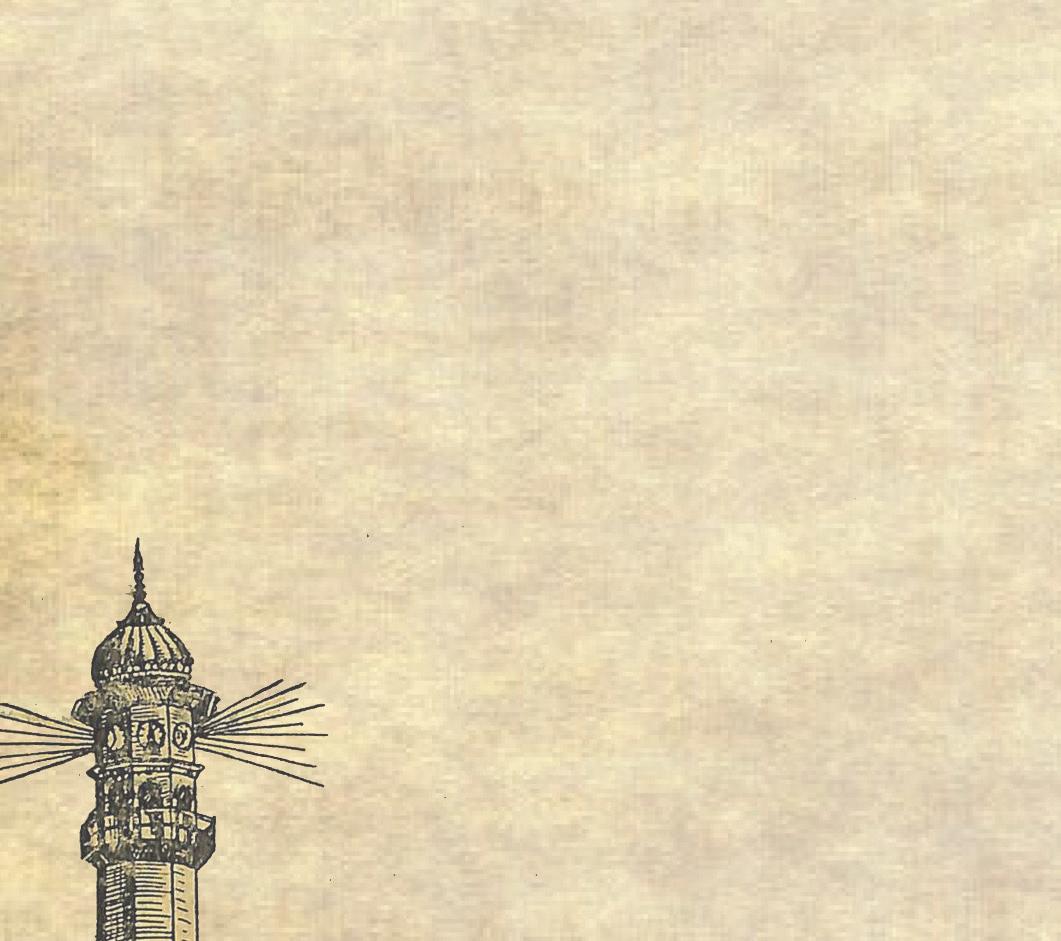
bounties prevailing during the











reign of the Queen. (Tarikh-e, Vol. 2, p. 61) To read this book, see: www.




25 August 1946: Hazrat Muslehe-Maudra saw a vision in which he was foretold by Allah the Almighty that a delicate time was coming for Islam and Muslims needed to unite to tackle that issue. On this day, Huzoorra wrote an article titled Al-Inzaar (The Warning), wherein he mentioned his vision in detail and advised the Muslims in this regard.




28 August 1992: On this day, during his Friday sermon, Hazrat Khalifatul Masih IVrh spoke about the arrogance of Western nations and the plight of oppressed countries. Huzoorrh announced the establishment of a global humanitarian organisation under the administration of the Jamaat, known as “Humanity First.” This charity organisation was formally founded in the following years. (Khutbat-e-Tahir, Vol. 11, p. 593)

For more details, see “The Ahmadiyya Khilafat’s call for Muslim unity: The solution to the Israel-Palestine issue” at alhakam. org 21 May 2021, pp. 21-23).
26-27 August


28 August 2016: Hazrat Khalifatul Masih Vaa laid the foundation stone of the first Ahmadiyya mosque in the small German town of Pfungstadt in the state of Hesse. (“Head of Ahmadiyya Muslim Community lays foundation stone for new Mosque in Pfungstadt, Germany,” www.pressahmadiyya. com)

26 August 1921: On this day, Hazrat Musleh-e-Maudra addressed
Continued from page 1 they say: ‘We are only promoters of peace.’” (Surah al-Baqarah, Ch.2: V.12) captures this precisely. All parties claim peaceful intent while their actions ensure violence continues. Neither can afford to stop, financially or politically.
The energy markets tell a parallel story. Despite sanctions, Russia still generates EUR 5.4 billion monthly from fossil fuel exports. India increased Russian oil purchases by 300%, saving $13 billion over two years. China now accounts for 47% of Russian crude exports. Europe, despite public condemnation, continues importing Russian gas when convenient.
The teaching of the Holy Prophet Muhammadsa to “help your brother, whether he is an oppressor or he is oppressed” by “preventing him from oppressing others” (Sahih al-Bukhari, Kitab al-mazalim, Hadith 2444) offers wisdom unheeded. The international community failed to stop Russia’s desire for revenge or the West’s victory celebrations, letting anger grow into war.
The US was once the dominant world power, but now several countries, such as Russia and China, compete for influence. This has left a gap in global leadership where the old ways of solving international conflicts don’t work anymore. The UN Security Council remains paralysed by vetoes. Regional powers pursue contradictory strategies that prolong rather than resolve conflict.
India is a good example of this deliberately unclear position, as it increases Russian energy purchases while maintaining Western partnerships. China provides Russia $240 billion in bilateral trade while positioning itself as a potential peacemaker. This fragmentation enables all parties to find alternative support, reducing pressure for compromise.
The human cost of these geopolitical games defies comprehension. Ukraine faces $524 billion in reconstruction costs; its population has declined 25% through death and displacement. Russia has suffered 950,000 casualties – five times its losses in all conflicts since World War II combined, a moral debt beyond any calculation.
Ending this war requires acknowledging hard truths. Total victory for either side remains impossible without nuclear escala-
tion risks. The economic interests perpetuating conflict must be explicitly confronted rather than ignored. Most critically, sustainable peace must address root causes, not merely symptoms.
The USA’s latest diplomatic initiative, threatening 100% tariffs, represents tactics without strategy. Real progress demands structural solutions that make peace more profitable than war. It would be wise for the world leaders to consider some possibilities:
First, internationally supervised referendums in disputed territories could respect self-determination while preventing forced annexation. The Quranic injunction to “be strict in observing justice […] even though it be against yourselves” (Surah an-Nisa’, Ch.4: V.136) provides the ethical framework. It binds both sides to accept outcomes that contradict their claims.
Second, Ukrainian neutrality with security guarantees from both NATO and Russia, enforced by international peacekeepers, could address competing security concerns. This mirrors successful Cold War arrangements in Austria and Finland, proving that neutrality need not mean defencelessness.
Third, phased sanctions relief tied to Russian withdrawal could create economic incentives for peace. Current sanctions, while damaging, have failed to alter behaviour because alternative markets exist. Coordinated relief could make compliance more attractive than resistance.
Fourth, reconstruction funded through frozen Russian assets could rebuild Ukraine while creating economic interdependence. The Marshall Plan demonstrated how former enemies become partners through shared prosperity.
Fifth, truth and reconciliation processes addressing all parties’ war crimes could prioritise healing over revenge. The Holy Prophet Muhammadsa declared that no race is superior to another race; instead, superiority is only through piety and good action. In modern times, Hazrat Mirza Masroor Ahmadaa, Khalifatul Masih V, has expounded on this teaching and highlighted it as a path to peace. (World Crisis and Pathway to Peace, pp. 87-88)
The choice before us
Some might argue this analysis ignores Ukrainian sovereignty or Russian security
concerns. Yet precisely because both narratives contain truth, neither side’s absolute victory serves humanity’s interests. The Holy Quran instructs, “And if two parties of believers fight [against each other], make peace between them.” (Surah al-Hujurat Ch.49: V.10)
When mediation fails, the international community must “fight the party that transgresses until it returns to the command of Allah,” (ibid.) meaning justice, not conquest. This divine guidance is available, yet remains unheeded by nations.
The tragedy is not that peace is impossible but that it has become economically inconvenient. Political and economic interests are taking precedence over service to humanity. Defence contractors profit from each day’s continuation. Energy traders arbitrage market disruptions. Geopolitical strategists see opportunity in opponents’ bleeding. Until human lives outweigh quarterly earnings, until justice supersedes advantage, the killing continues.
History offers precedent for wars ending when their profitability ceases. The Thirty Years’ War concluded when exhaustion made peace preferable to victory. The Korean War stabilised when a stalemate became obvious. Today’s technology and economic interdependence should make peace easier, not harder, to achieve. The Iran-Iraq war ended when the world ceased providing weapons to the warring nations.
But today’s wars benefit many different groups, such as investors, workers, and allied countries, giving people reasons to keep wars going, rather than to end them. Russian defence employment, Western military aid, energy market disruptions, and geopolitical realignments all generate conditions opposing peace.
Ultimately, the Alaska summit was a failure because it addressed symptoms, not causes. Until leaders acknowledge that economic incentives drive continuation, diplomatic initiatives remain in theatre. The question is not whether humanity can afford peace but whether it can survive its absence. Each day of delay adds to a bill measured not in currencies but in souls – a debt that compounds beyond any nation’s ability to pay.
Fazal Masood Malik & Farhan Khokhar Canada
Continued from page 1
turning ropes into snakes with a staff, were all illusions—especially in view of the fact that these spectacles were shown in an era when showmen performed all sorts of sleight of hand and people would be left confounded as to how a certain thing had actually occurred. Conjurors from among the British can show such illusions and tricks that make it appear as if they can revive a dead man, or make broken things appear as if they are perfectly intact. For example, in the Ain-i-Akbari as well, Abul Fazal has narrated a tale that a magician ascended into the sky in front of a crowd of people and one after the other, parts of his body fell from the sky. His wife burned herself on the pyre as per the Hindu tradition known as sati; however, the magician returned from the sky and asked for his wife. When she could not be found, he suspected that a certain vizier had hid her because he had feelings for her. Then, the King granted the magician permission to search the vizier, after which he pulled his wife out from under the vizier’s arm.”
The Promised Messiahas said: “In such circumstances, man is left with no choice but to have faith and deem the works of Prophets to be from God and consider the tricks of magicians to be deception and illusion. In this regard, the matter becomes a delicate one.
(

Answers to Everyday Issues









Opponents of Prophets, tabarruk and shirk, women using fragrance, seeking answers through research, angels at the Battle of Badr
Guidance regarding basic Islamic issues that Hazrat Amirul Momineen, Khalifatul Masih Vaa, has given on various occasions in his written correspondence and during MTA programmes is being published officially below for everyone’s benefit.
If God protects His prophets, does He also predestine their opponents to be evil?
Someone wrote to Hazrat Amirul Momineen, Khalifatul Masih Vaa, and asked:
“Since Allah the Exalted Himself protects the Prophets and shields them from the assaults of Satan, does Allah the Exalted also send the opponents of the Prophets? For their existence is also necessary. Is it not, then, their misfortune that they became opponents?”
In his letter dated 26 March 2023, Huzoore-Anwaraa provided the following answer to this question:
“The Holy Quran has elucidated with great clarity that there is no compulsion of any kind in matters of faith. The paths of good and evil, along with their respective benefits and detriments, have been made manifestly clear and mankind has been granted absolute choice to select for itself whichever path it desires. Whichever path one walks, the outcome will manifest for them accordingly. (Surah al-Baqarah, Ch.2: V.257-258)
“Furthermore, this world, being the Abode of Trial [dar al-ibtila’], is a place wherein impulses towards good and evil have been created for the testing of mankind, because no higher station can be attained without a trial. Hence, just as Satan strives to lead people astray in this world, so too does Allah the Exalted create impulses towards goodness in the hearts of men through His angels.
“Thus, when a person chooses a path for themself, Allah the Exalted manifests the outcomes for that person in accordance with that very path. Therefore, when the opponents of the Prophets, despite the existence of clear and open proofs in their favour, choose the path of opposition, they do so entirely of their own volition. There is no compulsion upon them from Allah the Exalted. However, since these people
cast aside the impulses originating from the angels and instead accept the satanic impulses, they fall into the clutches of Satan.
“Consequently, the opponents’ refusal to accept the Prophets is in fact due to their falling into the grasp of Satan and the arrogance found within them, which denies them the divine grace to advance towards righteousness. They imagine that the followers of the claimant to prophethood, who calls towards God the Exalted, are but very poor people, whereas they consider themselves to be great, possessors of knowledge, and more learned in matters of faith. They wonder, therefore, how they could possibly join such a community or take the oath of allegiance [bai‘at] at the hand of such a person. This is the very same reason that people today are not accepting the Imamas of the Age.
“In this regard, the Promised Messiahas states:
“‘Arrogance is such a calamity that it does not leave a person’s side. Remember, arrogance comes from Satan and turns the arrogant one into a satan. Until a person distances themself completely from this path, they can never attain the acceptance of truth and divine grace, because this arrogance becomes an obstacle in their path. Therefore, one must not show arrogance in any way, neither on account of knowledge, nor wealth, nor prestige, nor caste and family, nor lineage and pedigree, for arrogance is mostly born of these very things. Until a person purifies themself of these conceits, they cannot become favoured and chosen in the sight of Allah, Great is His Majesty (jalla sha’nuhu). Nor are they granted that divine cognisance [ma‘rifat-e-ilahi] which incinerates the worthless matter of carnal passions, because this conceit is Satan’s portion and Allah the Exalted does not like it.’ (Address at the Annual Convention, 29 December 1904, as cited in Tafsir-e-Masihe-Maw‘udas, Vol. IV, p. 189)”

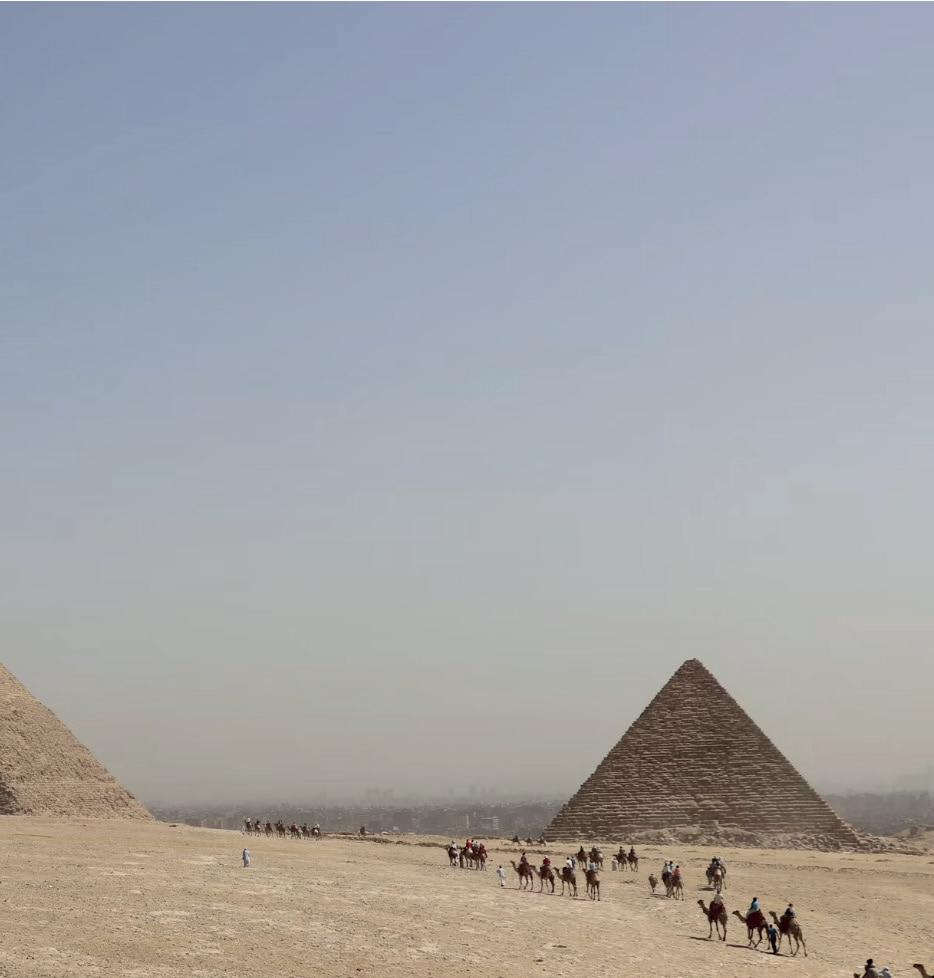

Is tabarruk tantamount to shirk?
Someone wrote to Hazrat Amirul Momineen, Khalifatul Masih Vaa, and asked: “Is having something blessed for the purpose of tabarruk [seeking blessings] an act of shirk [i.e., associating partners with Allah]?
“Further, a hadith states that the prayer of a woman who comes to the mosque wearing perfume is not accepted until she performs a ghusl. Yet, women today do wear perfume. What, then, is the explanation of this hadith?”
In his letter dated 26 March 2023, Huzoore-Anwaraa provided the following guidance on these matters:
“Numerous ahadith exist regarding the permissibility of blessing something by way of tabarruk or having items blessed for this purpose, from which it is known that the Companions used to keep items belonging to the Holy Prophetsa in their possession as a tabarruk. (Sahih al-Bukhari, Kitab al-wudu’, Bab al-ma’i lladhi yughsalu bihi sha‘ru l-insan). The Holy Prophetsa himself also used to bestow items upon the Companions as a tabarruk. (Sahih Muslim, Kitab al-hajj, Bab bayani anna s-sunnata yawma n-nahri an yarmiya thumma yanhara…)
“Through the blessings of the Holy Prophetsa, Allah the Exalted also bestowed upon his most ardent devotee, the Promised

Messiahas, who was sent in this age for the revival of the faith, the following glad tiding by way of revelation:
“‘I shall grant you honour and shall multiply you. I shall invest your relics with blessings, such that kings shall seek blessings from your garments.’ (Asmani Faislah, Ruhani Khazain, Vol. 4, p. 366)
“Therefore, the blessing that has reached Khulafa-e-Ahmadiyyat through the medium of the Holy Prophetsa and his spiritual son, the Promised Messiahas – the blessing that people obtain from these personages owing to their love for Khilafat and their connection with it – contains nothing of shirk, nor is there any harm in it. In our ordinary, daily lives, we also observe that people keep the belongings of their elders and loved ones with them out of love and reverence. If it is considered natural for people to keep belongings of their elders and loved ones for the sake of the blessings associated with them, then why should it be deemed objectionable for them to obtain blessings from the exalted personages established on the seat of Khilafat-e-Haqqah Islamiyyah Ahmadiyyah – the very institution founded for the renaissance of Islam?
“My general practice is that when someone asks me for tabarruk, I touch the item to the ring of the Promised Messiahas, which is a source of blessing due to its having been in the use of Huzooras for a long period. This is because the true source of blessing is his person and his belongings, and it is through him as a medium that this blessing has reached the Khulafa’ as well.”
What is the ruling on women wearing perfume?
“As for the matter of women wearing perfume, there is also a saying of the Holy Prophetsa that one should apply perfume on Friday, even if it means taking some from one’s wife’s perfume. (Sahih Muslim, Kitab al-jumu‘ah, Bab at-tibi wa s-siwaki yawma l-jumu‘ah). Here, the question arises: if women were not permitted to wear perfume, why did they keep perfume for themselves in their homes?
“Similarly, it is found in a hadith that, on the occasion of a man’s daughter’s wedding, the Holy Prophetsa gathered perspiration from his arms with a tree branch into a vial and gave it to him, instructing him that when his daughter wished to apply perfume, she should dip the branch into the vial and use that fragrance. (al-Tabrani, Al-Mu‘jam al-Awsat, Bab al-alif, Bab mun ismuhu ibrahim)
“Thus, a clear prohibition on women wearing perfume is not mentioned in the authoritative ahadith. As for the ahadith in which a prohibition on women wearing perfume is found, Imam al-Bukhari did not include such ahadith in his Sahih “Furthermore, we should also bear in mind that not all narrations are absolutely sahih and that certain rulings found therein were contextual to the time and place they were given. It is, for example, possible that someone may have had an allergy to a particular type of perfume and a woman was prohibited from using that specific fragrance.”
How should Ahmadi missionaries proceed when they have a theological question?
A murabbi wrote to Hazrat Amirul Momineen, Khalifatul Masih Vaa and cited the following verses of the Holy Quran: “But for him who feared to stand before his Lord and restrained his evil desires, the Garden will be a resort. They ask thee concerning the Hour: When will it arrive? What concern hast thou with talk of it? Thy Lord alone knows the ultimate limit of its happening.” (Surah an-Nazi‘at, Ch. 79, V.4145)
He then enquired, “Is the meaning here that, after reading these verses, the thought that arises in a person’s heart about when they will receive the reward for their deeds and witness victory – that Allah the Exalted has stated here that one should not think about that Hour, but simply continue to perform good deeds and not try to determine its time?”
In his letter dated 3 April 2023, Huzoor-eAnwaraa provided the following guidance in this regard:
“The commentaries on the aforementioned verses as articulated by the Promised Messiahas, Hazrat Musleh-e-Maudra, and Hazrat Khalifatul Masih IIIrh are all available. They are also present on the
Alislam.org website. You are a missionary of the Jamaat; you ought to find the answers to your questions yourself by studying these commentaries. This is because when you read a book for the answer to one question, many other subjects will also pass before your eyes, which will certainly increase your knowledge, a very necessary thing for a missionary of the Jamaat. Therefore, instead of asking questions, cultivate the habit of reading and researching for yourself.”
What is the interpretation of the Quranic verses about angels fighting in the Battle of Badr?
Someone asked Hazrat Amirul Momineen, Khalifatul Masih Vaa, how one could explain to an atheist that angels fought on behalf of the Muslims against the disbelievers of Mecca in the Battle of Badr. [...]
In his letter dated 3 April 2023, Huzoor-eAnwaraa provided the following answer to this question:
“Where the subject of the Muslims’ aid by means of angels is mentioned in Surah alAnfal of the Holy Quran, it does not mean that angels came down to earth in their personal forms to fight the disbelievers. Rather, it is allegorical speech, and its meaning was to give the believers the glad tiding of help and victory from God the Exalted. It is for this reason that, at the end of the verse, Allah the Exalted states that Allah sent down this news merely as a glad tiding so that their hearts might be at rest thereby, and that help comes only from Allah.
“In his commentary on this verse, Hazrat Musleh-e-Maudra states that here, ‘It did not mean that angels would actually fight these disbelievers. Rather, if the help of angels is seen in a vision [kashf], its meaning is that God the Exalted will help, and in this way, the believer receives a glad tiding.’ (Tafsire-Saghir, p. 220, footnote under verse 11 of Surah al-Anfal)
“Expounding upon verse 13 of Surah alAnfal, i.e., ‘At the same time thy Lord commanded the angels: I am with you; so make firm the steps of those who believe. I will cast terror into the hearts of those who disbelieve. O ye who believe, strike at their necks and strike at every pore and tip,’ the Promised Messiahas writes:
“‘That is, captivate their hearts and infuse them with the words of steadfastness. In other words, say to them, ‘Fear not, nor grieve,’ and convey other such words by which their hearts may find reassurance. Thus, all these verses indicate that Allah does indeed speak to His chosen friends [auliya’] and addresses them, so that their certainty and spiritual insight may increase, and that they may be among those who are deeply content.’ (Hamamat-ul-Bushra, Ruhani Khazain, Vol. 7, p. 299, translated from the Arabic)
“Therefore, the divine glad tidings of the believers receiving the help of angels were, in fact, based on metaphorical language, and the appearance of angels to the Holy Prophetsa and some Companions on the battlefield of Badr were all visions [kashf]; it is not correct to take them as literal reality. Accordingly, Hazrat Syed Zain-ul-Abidin Waliullah Shahra, in his commentary on the ahadith recorded in Sahih al-Bukhari’s ‘Kitab al-maghazi’ or ‘Book of Military Expeditions’ under the chapter ‘Kitab almaghazi’ or ‘The Angels’ Presence at Badr’,
writes:
“‘The purpose of this chapter is to demonstrate the weakness of the narrations from Bayhaqi and others, in which it is mentioned that the disbelievers killed by the angels at the Battle of Badr were recognised by the marks of the wounds on their necks. These narrations are unreliable and are related in connection with the commentary of a verse in which the command to strike the necks is given. Darb ar-riqab (striking the necks) and darb kulli banan (striking every pore and tip) refer to a forceful attack in which the accuracy of the target is kept in view. The mention of the presence and sighting of the angels in the narrations under this chapter is of the nature of visions [mukashafat], and their fighting is also of a kind that is suited to their state, not one of arrows and muskets. And their sighting occurs with spiritual vision, not the physical eye. The Holy Prophetsa also witnessed this, as did the Companions, and such a vision is also granted to the friends of Allah [auliya’ullah]. […] At the site of Badr, the enemy’s encampment on the high ground of the sand dune; the Holy Prophet’ssa
descent into the low-lying part of the valley; the small number of the Companions remaining hidden from the enemy’s sight; the appearance of wind and rain; every single arrow of the Companions landing precisely on its mark and proving fatal; the enemy’s panic and the Companions’ resolute courage – all this was the marvel of the influence of the angels of Allah’. (Sharh Sahih al-Bukhari by Syed Zain-ul-Abidin Waliullah Shahra, Vol. VIII, pp. 71-72) [...]”
(Compiled by Zaheer Ahmad Khan, Head of Records Department, Private Secretariat, London and translated by Al Hakam)

Why is pork consumption forbidden in Islam?
Masood Ashraf USA
The consumption of pork is unequivocally forbidden in Islam. This command is not merely an arbitrary dietary law but a direct instruction from God. In the Holy Quran, Allah declares: “He has made unlawful to you only that which dies of itself, and blood and the flesh of swine, and that on which the name of any other than Allah has been invoked.” (Surah al-Baqarah, Ch.2: V.174)
The term used for pork, lahm al-khinzir, is described as rijs, meaning impure or abominable. This prohibition is repeated across the Quran in several places, thus highlighting its moral gravity and spiritual significance. (See Surah al-Maidah, Ch.5: V.5, Surah al-An’am, Ch.6: V.147, and Surah an-Nahl, Ch.16: V.117)
Islam does not base the worth of a command on whether humans comprehend its wisdom fully. Instead, divine commandments are to be followed out of obedience and trust in God’s superior wisdom.
Interestingly, this view is not unique to Islam. The Bible also clearly prohibits the consumption of pork. In Leviticus 11:7-8, it states: “And the pig, though it has a divided hoof, does not chew the cud; it is unclean for you. You must not eat their meat or touch their carcasses; they are unclean for you.” Similarly, Isaiah 66:17 strongly condemns those who eat pork, associating such behaviour with divine punishment.
These texts show a long-standing religious view of the pig as a spiritually impure animal. Jesusas, though believed by many to have lifted dietary restrictions, never permitted the consumption of pork. In fact, he used the swine metaphorically to denote
spiritual ignorance and moral corruption. In Matthew 7:6, he warned, “Do not give what is holy to the dogs; nor cast your pearls before swine, lest they trample them under their feet, and turn and tear you to pieces.” This powerful image underscores the perception of swine as unworthy of sacred things, affirming their association with impurity in religious thought.
From a medical and scientific perspective, modern research supports many of the concerns that Islamic teachings raise. Pigs are omnivorous scavengers that will consume waste, excrement, and decaying matter. Their digestive system is notably inefficient at filtering toxins, which can become embedded in their flesh.
Pork has long been associated with diseases such as trichinosis – a parasitic infection caused by Trichinella spiralis – as well as Salmonella, Taenia solium (pork tapeworm), and hepatitis E. Though some of these dangers have been reduced through modern hygiene and cooking methods, the potential risks remain real.
Studies have also linked high pork consumption to chronic illnesses such as colorectal cancer, cardiovascular diseases, and obesity-related complications. The physiological harm of consuming pork continues to validate the divine prohibition, showing how religious laws often precede scientific discovery.
Beyond physical health, Islam strongly emphasises the spiritual impact of food. What we consume influences not just our bodies but our minds and souls. Hazrat Mirza Ghulam Ahmadas, the Promised Messiah, elaborated beautifully on the symbolic and
21st Jalsa Salana held in Bosnia
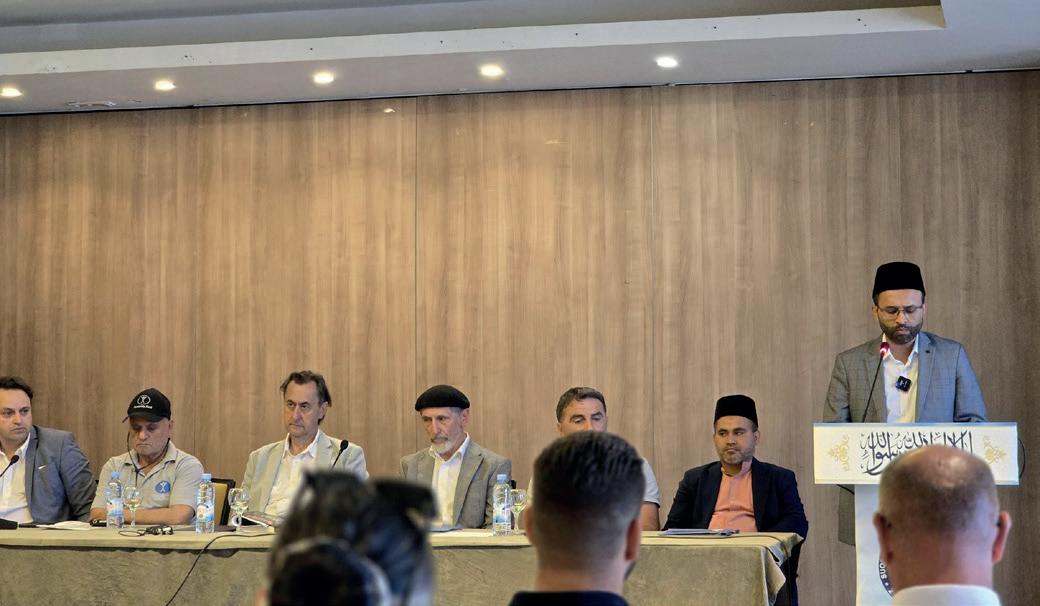
Rahman
National President, Jamaat-e-Ahmadiyya Bosnia
On 29 June 2025, the 21st Jalsa Salana of Jamaat-e-Ahmadiyya Bosnia was held. It was attended by over 400 participants, including local members, government officials and international guests from Germany, Italy, Serbia, Croatia, Albania, Slovenia, North Macedonia and India. The Jalsa was conducted in two sessions.
The first session, presided over by Wasim Ahmad Sahib, a missionary from Serbia, began with a recitation from the Holy Quran, followed by a Bosnian nazm The audience then heard an address on the introduction and importance of Jalsa Salana by Professor Munib Efendić, a speech on Islam and the Ummah by Mufeezur Rahman
Continued from previous page
moral implications of pork consumption.
He wrote, “In its prohibition of swine, the Torah has gone so far as to forbid even touching it, and it clearly says that the prohibition is for all times [...]” (Four Questions by Mr. Sirajuddin, a Christian, and their Answers, pp. 56-57)
He also explained that the pig represents shamelessness, gluttony, and moral decay, and that consuming its flesh can gradually deaden a person’s sense of spiritual refinement. The prohibition, therefore, serves not just to protect the physical body but to cultivate purity of heart and character. (The Philosophy of the Teachings of Islam, pp. 38-39)
Some sceptics ask: if God created pigs, why would He forbid their consumption? This question misunderstands the role of creation and the function of divine commandments. Not everything that exists is created for human consumption. Poisonous plants, harmful substances, or venomous animals are part of the ecosystem but not meant for our direct use.
Pigs, in many ways, serve a vital ecological function. As scavengers, they help decompose waste and dead matter. Their existence benefits environmental cleanliness, but that does not mean their flesh is meant to nourish human beings. The Quran teach-
Sahib and a presentation titled “Ahmadiyya Muslim Jamaat – Its Beliefs and Task” by Nedim Hadžibulić Sahib. A documentary film was shown on the theme “Prayer – An Ancient Practice or Real Solution.”
An introductory speech was delivered by Mr Halil Arnaut, Director of the government orphan house in Zenica. This was followed by a touching essay read by an orphan child, expressing what Jalsa means to him from a social perspective. During the break for coffee and prayers, guests visited exhibitions on the Holy Quran translation and Islam Ahmadiyyat.
The second session was presided over by Amir Sahib of Jamaat-e-Ahmadiyya Germany. The session began with a recitation from the Holy Quran, followed by a presentation titled “Hazrat Mirza Masroor Ahmad – Ambassador of Peace” by Kadrija Hodžić Sahib. Guest introductory speeches highlighted the work of the Ahmadiyya Muslim Jamaat in Bosnia and its importance for Bosnian society. The concluding speech was delivered by Amir Sahib, Jamaat-eAhmadiyya Germany.
Tabligh stall held in Oslo, Norway
Khalid Mahmood Malik
Qaid Tabligh, Majlis Ansarullah Norway
Majlis Ansarullah Norway set up a Tabligh Stall on 19 July 2025 outside the main railway station in Oslo (Oslo S). In total, 12 ansar and seven khuddam took part in this effort. Various religious and ethnic
es that life is a test. The presence of harmful or forbidden things is a part of that test, to see whether humans can exercise moral restraint and obedience to divine guidance. Just as interest, alcohol, and drugs exist in society but are forbidden, so too pork is a test of whether one will choose divine command over personal desire
Moreover, Islamic teachings acknowledge that certain forbidden things may have permissible uses in specific contexts. For instance, pig organs, such as hearts, are sometimes used in medical research and education due to their anatomical similarities to human organs. This utilisation is not for consumption but serves scientific and educational purposes, reflecting the nuanced understanding within Islamic jurisprudence that considers intent and necessity
Islamic law is rooted in five higher objectives: the protection of religion, life, intellect, lineage, and property. Anything that poses a threat to these principles is discouraged or forbidden. Pork consumption, by its association with physical diseases, spiritual dullness, and moral desensitisation, can be seen as undermining multiple values at once.
Moreover, Islam’s dietary laws are structured to promote both physical well-being and moral discipline. In the same way that prayer trains the spirit and fasting develops
backgrounds visited the stall and showed interest. The message of Islam Ahmadiyyat and the purpose of the Promised Messiah’sas advent was conveyed from different perspectives. Around 300 pamphlets and pieces of Jamaat literature were distributed by the participants.
National Peace Conference held by Lajna Imaillah, the Netherlands
Abida Mahmud Chowdhrie
Secretary Tabligh, Lajna Imaillah, the Netherlands
On 14 June 2025, Lajna Imaillah the Netherlands held its annual National Peace Conference at the Baitul Afiyat Mosque in Almere, with the theme “Change the World: Strive together for Peace!” The conference was the start of the three-month-long “peace campaign”.
The Peace Conference was attended by 94 ladies, including 23 non-Muslim guests. The programme started with a recitation from the Holy Quran, followed by an introduction to Islam Ahmadiyyat by Maira Faiza Siddiqui Sahiba. A video was shown that was made by a Dutch reporter about the opening of the Baitul Afiyat Mosque in 2019 by Hazrat Khalifatul Masih Vaa. After an Urdu poem, guest speakers were invited
willpower, abstaining from forbidden foods builds the habit of self-control. This is not merely about food but about the principle of submission.
The Quran states: “And it behoves not a believing man or a believing woman, when Allah and His Messenger have decided a matter, that there should be a choice for them in the matter concerning them.”
(Surah al-Ahzab, Ch.33: V.37) Thus, the true believer finds beauty and liberation in obedience – even when the command challenges their understanding.
In Islamic teachings, moderation and purity are emphasised across all aspects of life. The Holy Prophet Muhammadsa advised that one should eat in three parts: one part for food, one part for water, and one part for air. (Sunan Ibn Majah, Kitab al-atʿimah, Hadith 3349)
This promotes not only a healthy lifestyle but a consciousness of what one allows into their body. Food is more than just sustenance; it is part of a holistic spiritual lifestyle. Just as one would not allow immoral entertainment or impure thoughts to pollute the heart, one must be vigilant about what is consumed physically.
In a world increasingly driven by materialism, the Islamic stance on pork serves as a reminder that not all that is available is beneficial. The spiritual dignity of a human
to hold their lecture, including Mrs Patricia Caroline Haveman, Founder and the International President of Mundo Younido and Dr Aagje (A.M.) Voordouw MCC, Advisor for Diversity and Inclusion at the University of Applied Sciences Windesheim in the city of Zwolle.
After this, Attia Aslam Sahiba, Sadr Lajna Imaillah of the Netherlands, delivered a speech about the teachings of Islam regarding the establishment of peace in the world.
After silent prayer, the guests were able to visit the Tabligh exhibition and bookstall. Sadr Lajna Imaillah, the Netherlands, presented the book Revelation, Rationality, Knowledge and Truth and some other books with flowers to the guest speakers. All other guests were presented with the book The Philosophy of the Teachings of Islam

being demands that we rise above base desires. Choosing what to eat becomes a reflection of who we are and what values we uphold. The pig, an animal known for its shamelessness and filth, is not suited for those who wish to attain spiritual clarity and moral elevation.
Thus, the prohibition of pork is not an isolated rule but part of a broader moral and spiritual framework that defines the Islamic way of life. It combines divine wisdom, spiritual symbolism, health guidance, and moral training. Through its ban, Islam calls on believers to elevate themselves – to consume that which is pure, avoid that which is impure, and to constantly be mindful that every choice in life, even what we eat, has consequences beyond the surface. This divine law, echoed by previous prophets and confirmed through modern insights, remains as relevant today as it was 1,400 years ago.
Centenary of the Ahmadiyya Mission in Indonesia: The early years and press coverage
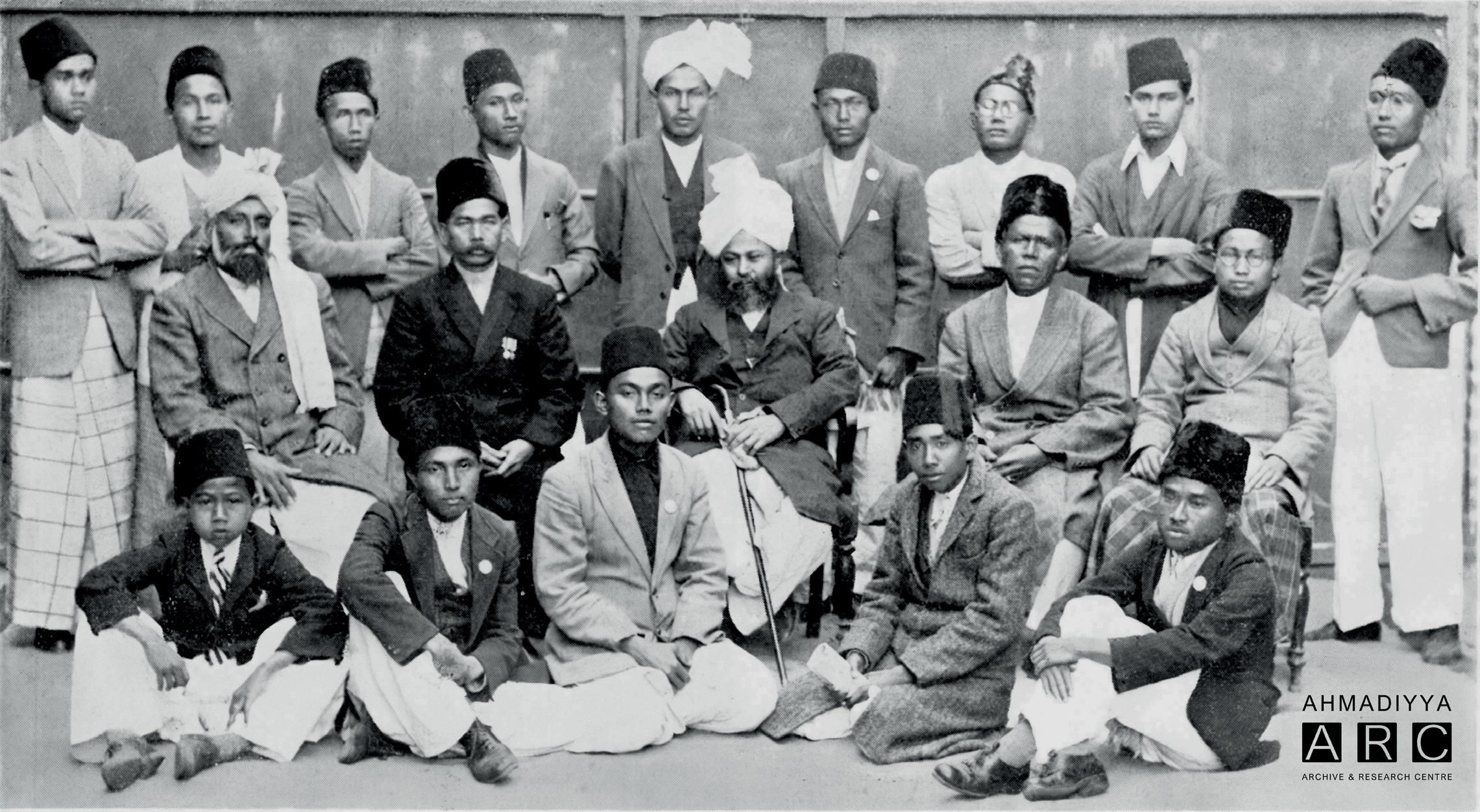
Ata-ul-Haye Nasir
Ahmadiyya Archive & Research Centre
In 1923, four Sumatran youth – Maulvi Abu Bakr Ayub Sahib, Maulvi Ahmad Nuruddin Sahib, Maulvi Zaini Dahlan Sahib and Haji Mahmud Sahib – came to India for their religious education. In August 1923, Allah’s decree drew them to Qadian after their visit to Calcutta, Lucknow and Lahore.
These youngsters met with Hazrat Musleh-e-Maudra and requested for their religious education and training to be arranged. Huzoorra accepted the request and arranged for their education. After being convinced about the truthfulness of the Promised Messiahas, they accepted Islam Ahmadiyyat.
After swearing allegiance in Qadian, the youngsters preached to their relatives back home through letters, thus paving the way for the propagation of Ahmadiyyat to those islands.
On Hazrat Musleh-e-Maud’sra return from his tour of Europe in 1924, several receptions were held in his honour. The Sumatran youngsters also arranged a tea party on 29 November 1924 and spoke to Huzoorra in regard to preaching the message of Ahmadiyyat in their homeland.1
Hence, Hazrat Musleh-e-Maudra sent Hazrat Maulvi Rahmat Alira to spread the message of Islam Ahmadiyyat to the people of the Dutch East Indies – present day Indonesia. He departed from Qadian on 17
August 1925, exactly 100 years ago.2
This article will focus on presenting the historical records about the Ahmadi missionary’s arrival in the islands, his preaching activities in the early years and a glimpse of the press coverage.
Departure, rumours and a series of telegrams
Since Hazrat Maulvi Rahmat Ali’sra departure from Qadian, no information had yet reached about his well-being and rumours began circulating that he had been detained by the Dutch authorities – who were governing Indonesia at the time.
Hence, on 15 October 1925, a letter was sent to the Foreign and Political Department of the British Indian Government by Hazrat Maulvi Abdur Rahim Nayyarra, who raised concerns about the rumours, stating that the “Dutch authorities have detained our missionary Maulvi Rahmat Ali at Subang Sumatra.”3
He expressed his hope that the Dutch Government will respect the rights of British subjects which a Dutch European or East Indian expects from British authorities.4
A response was received on 24 October, stating that “inquiries are being made into the matter”5 and the acknowledgement of this reply was sent from Qadian on 28 October wherein the authorities were further informed that a telegram to the missionary remained unanswered.6
Official records also suggest that – due to some misunderstanding or their usual security protocols – the British officials began an enquiry about the missionary, initiating a long correspondence between the Foreign and Political Department, Home Department, Director Intelligence Bureau (DIB) and officials in the Dutch East Indies. However, on 14 November 1925, a telegram from the Foreign and Political Department to the British Consul-General in Batavia declared that “it was believed that deputation was politically harmless.”7
The above-quoted telegram further mentioned the Jamaat’s concerns about the missionary’s safety and thereafter, a reply from the Consul-General stated that “according to the local authorities, person named is not being detained at Sabang.”8 This response was then conveyed to Qadian.
The British Consul-General wrote to the Foreign and Political Department, on 20 November, mentioning further details including a letter from Qadian that was sent on behalf of Hazrat Khalifatul Masih IIra –addressed to the missionary. The British official also shared information about the whereabouts of the missionary.
Mentioning all these details, the British Consul-General stated that the Acting Consul-General at Medan, Mr Bailey, had been in communication with him on the subject of Rahmat Ali Sahibra, regarding whose whereabouts Mr Bailey “had received an enquiry by telegram from Amritsar
signed ‘Secretary, Qadian, Betala’”. This telegram, according to the British ConsulGeneral, had been followed up by a letter addressed to Mr Bailey from “The Secretary for Missionary Work to Hazrat Khalifatul Masih, Qadian, Punjab.”
The British Consul-General continued by mentioning that the Acting Adviser to the Government of the Dutch East Indies for Native Affairs “heard of the arrival at Sabang some two months ago of an Ahmadiyya missionary, who expressed his intention of going to Tapatoean, on the West Coast of Atjeh, Sumatra, where there is a numerous colony of Malays from Padang, which latter place is a centre of devout Muslim activity further to the South.”9
Thereafter, on 23 November 1925, the Acting Consul-General at Medan sent a detailed report to the Foreign and Political Department in regards to the enquiry on Hazrat Maulvi Rahmat Alira. He mentioned the telegrams received from Qadian on 17 and 28 October. He went on to mention further correspondence he had with the Jamaat and the government officials, regarding the same matter.
On 4 December, the British ConsulGeneral in Batavia informed the Government that Rahmat Ali Sahibra was in Tapatoean. The British official stated that according to the latest information received by the Dutch authorities, Maulvi Rahmat Ali Sahibra arrived at Tapatoean (Sumatra) on 2 October and intended to proceed to
Padang within a month’s time.”10
This message was conveyed to Qadian on 7 December. In response, a letter of thanks was sent to the Under Secretary to the Government of India, on behalf of Hazrat Musleh-e-Maudra, stating:
“I am directed by the Head of the Community to thank you and through you to the British Government” and the British “Consul at Batavia for communicating information about our missionary’s safety.”11
During this ongoing correspondence between the government officials, it was stated that “Enquiries made by the D.I.B. have elicited that there is nothing politically objectionable against Rahmat Ali.”12
A comprehensive personal introduction to Maulvi Rahmat Ali Sahibra was included in the official correspondence which stated that “he is reported to take no interest in politics.”13
On 4 January 1926, the Acting Consul-General at Medan informed the Government about the activities of Maulvi Rahmat Ali Sahibra, stating:
“It appears that he is making propaganda for the Ahmadiya society, whence he receives a salary. He is said to be quiet and peaceable and to exercise a good influence over the ‘Sumatra Thawalib’ (progressive) and ‘Kaoem Koeno’ (conservative) parties.”14
Sowing the seed in the islands
Upon reaching the islands – now Indonesia – Maulvi Rahmat Ali Sahibra propagated the message of Islam Ahmadiyyat with great zeal, as a result of which Allah the Almighty blessed his efforts with good results.
During a speech at the Jalsa Salana 1925, Hazrat Musleh-e-Maudra informed the Jamaat about the establishment of Ahmadiyyat in Sumatra and stated that around 15 people had accepted Ahmadiyyat within a few days.15
During the 1927 Majlis-e-Shura, held on 15-17 April, a summarised report of the Indonesian Mission was presented. According to this report, the headquarters had been changed from Tapak Tuan to Padang and the missionary had to face severe opposition from the non-Ahmadi Muslims and Christians. The opponents were making all possible efforts to urge the government to expel him from the country. The missionary reported that he delivered various speeches in large gatherings and discussions were also held, attended by high-ranking government officials and dignitaries as well.
In 1926, the number of new converts was 70, while during the year 1927 – thus far –150 more people had accepted Ahmadiyyat in Padang. By that time, there were 17 students from Java and Sumatra who were attaining religious knowledge in Qadian and writing articles for the newspapers of their country as well.16
The above-quoted Shura report also mentioned a periodical called “Iqbal”. Its full name was Iqbaloel Haq. In a previous speech, at the Jalsa Salana 1926, Hazrat Musleh-eMaudra had stated that a distinguished local non-Ahmadi Muslim launched a periodical at his own expense and invited Ahmadis to publish articles about Ahmadiyyat in that periodical.17
We learn from the Indonesian press that considering the increasing hostility shown by the opponents of the Jamaat, a committee
was established with the cooperation of some good-natured non-Ahmadi Muslims. Its aim was to invite the non-Ahmadi scholars to dialogue and to resolve the differences in a peaceful manner by presenting theological arguments. This committee was called “Mentjari Hak Penoelak Sjoebahat”. The committee launched the periodical Iqbaloel Haq in July 1926.
In addition to the articles by Ahmadis, articles by many non-Ahmadi scholars were published in which they presented their arguments against the Ahmadiyya beliefs. In the 3 August 1926 issue, an announcement from this committee was published, outlining a plan to send a delegation of nonAhmadi scholars to Qadian so that they could themselves thoroughly get to know the beliefs of Ahmadiyyat and claims of the Promised Messiahas
A report from Maulvi Rahmat Ali Sahibra stated:
“The Ulema are bitterly opposing our movement here. They are trying to keep the people away from us by all sorts of means. Some of them reported us to the Government, saying that we believed in a bloody Mahdi who proclaims a holy war against the ‘infidels.’ I had to send a telegram to contradict this misrepresentation of our Movement.
“We have started a monthly paper from here in Malaya, the vernacular of the people, and we are thinking of making it a weekly if it proves a success. The Ulema are issuing fatwa after fatwa against us, and people abuse me openly. Some of the nobles are favourably disposed towards us, and they are beginning to defend our movement against the Maulvis.”18
Press coverage
The activities of the Ahmadiyya Mission in Indonesia caught the attention of the local press. A glimpse is presented below:
A Dutch periodical wrote about the above-mentioned committee and the launch of the magazine, stating:
“In Padang, a new religious magazine saw the light of day, the ‘Iqbaloel Haq’ (Acceptance of the Truth), headed by M. T. Soetan Maharadja and by the board members Aboebakar Baginda Maharadja and Daoed Bangso Diradjo of the ‘Comité mentjari haq, penolaq sjoebahat’ (Committee for the search of the truth, the dispelling of doubt).”19
Another issue of the same periodical published an article, titled “The AhmadiyyaQadian Movement on Sumatra’s West Coast”, and mentioned the preaching activities of Hazrat Maulvi Rahmat Alira 20
This was followed by another article21 which mentioned another local periodical, Boeka Mata of 26 November 1926. The latter was devoted to the arguments against the Ahmadiyya Muslim Jamaat and a letter to the editor from some Aboezeed bin Hilal was also mentioned in which he asked the editor for some details about the Ahmadi missionary and some local Ahmadis.
Another local journal, Mededeelingen: Tijdschrift voor zendingswetenschap – in its 1926 issue – wrote that a British-Indian Ahmadiyya missionary, Rahmat Ali, is travelling through Sumatra and propagating his beliefs. It also mentioned the magazine Iqbaloel Haq
An announcement was made about a
debate that was scheduled to be held on 9 January 1927 between Maulvi Rahmat Ali Sahibra and some Pakih Hasim.22
A detailed account was published about the missionary activities of Maulvi Rahmat Ali Sahibra which also mentioned the committee called “Mentjari Hak Penoelak Sjoebahat”.23
Another local newspaper published an article about his missionary activities. The article began with the introduction of the Promised Messiahas and his claims. It was stated that during the past two years, the missionary had succeeded in converting many locals to Islam Ahmadiyyat, for instance in Padang, Pandang, Fort de Kock, Fort van der Capellen and some other places. It was mentioned that the message is being spread through a magazine, titled Iqbaloel Haq. This was followed by some details of the debates with the non-Ahmadi Muslims of the local area.24
The same article was published by De Nieuwe Vorstenlanden on 3 December 1927.
The local newspapers announced about an upcoming gathering where a debate was scheduled to be held between the Ahmadiyya missionary and the non-Ahmadi clerics. However, the opponent did not come for the debate, hence, Rahmat Ali Sahibra delivered a speech about the prophecies mentioned in various scriptures in regards to the advent of the Promised Messiah.25
Another article emerged, featuring a group photo of the speakers who delivered speeches in 24 different languages at a historic Jalsa in Qadian on 29 January 1926.26 The speech in Dutch was delivered by an Indonesian, Ahmad Sarido Sahib27, who was studying in Qadian at the time. The article stated that in one of their previous issues they had mistakenly written that Hazrat Mufti Muhammad Sadiqra was the head of the Ahmadiyya Community. So, correcting its statement, the periodical wrote:
“Dr. M. M. Sadik, a leader of Ahmadiyya and a great scholar, said, ‘The head of the Ahmadiyya Community is Hazrat Mirza Bashir-ud-Din Mahmud Ahmad[ra] who is currently in Qadian.’”
The article continued by mentioning Hazrat Musleh-e-Maud’sra visit to England, and stated that he laid the foundation of the Fazl Mosque in London which was later inaugurated in 1926. The article further
mentioned Hazrat Maulvi Abdur Rahim Dardra and Hazrat Malik Ghulam Faridra, and the missionary activities in London.
A lengthy article was published in a local newspaper about a local Ahmadi who had studied in Qadian for three years. This article narrated his experience in Qadian during those three years.28
According to a local newspaper, Maulvi Rahmat Ali Sahibra was supposed to go back to Qadian, however, this plan was postponed since no replacement had arrived yet.29
Eventually, in October 1929, Hazrat Maulvi Rahmat Alira returned to Qadian. It was reported by an Indonesian newspaper that he would soon return to Indonesia and that another missionary, Maulvi Muhammad Sadiq Sahib, would also come with him.30
These two missionaries reached Indonesia in December 1930, and hence began the second phase of the Ahmadiyya Mission in Indonesia. Their activities continued to attract the attention of the local press which served as a great means for spreading the message of the Promised Messiahas. For instance, a local newspaper published the photograph of the Promised Messiahas and gave an extensive introduction of his claims.31
The message continues to echo in Indonesia
The above was just a glimpse into the press coverage received by the Ahmadiyya Muslim Jamaat in Indonesia in the early years. The message of Islam Ahmadiyyat continued to echo in that country during the coming years as well, under the blessed guidance of Khilafat-e-Ahmadiyya.
Indonesian Ahmadis also played a huge role in the country’s independence from the Dutch and rendered great services for their homeland despite facing severe persecution. More details have been narrated in our previous article, titled “Jamaat-eAhmadiyya’s role in Indonesia’s independence from the Dutch”.32
During this blessed era of Hazrat Khalifatul Masih Vaa, Jamaat-e-Ahmadiyya Indonesia is making even greater progress, and it will continue to flourish, insha-Allah
Endnotes
1 Al Fazl, 4 December 1924, p. 2
2 Al Fazl, 20 August 1925, p. 1
3 National Archives of India, Foreign and Political Department, External (Secret), 1925, File No. 421-X
4 Ibid.
5 Ibid.
6 Ibid.
7 Ibid.
8 Ibid.
9 Ibid. 10 Ibid. 11 Ibid.
12 Ibid.
13 Ibid.
14 Ibid.
15 Minhaj-ut-Talibeen, Anwar-ul-Ulum, Vol. 9, p. 169
16 Report Majlis-e-Mushawarat 1927, pp.
35-36
17 Anwar-ul-Ulum, Vol. 9, p. 412
18 The Review of Religions, September 1926, p. 1
19 Overzicht van de Inlandsche en Maleisisch-Chineesche pers, 24 July 1926
20 Ibid., 9 October 1926
21 Ibid., 4 December 1926
22 Bintang Timoer, 5 January 1927
23 Tjaja-Soematra, 17 November 1927
24 De Sumatra Post, 1 December 1927
25 Sumatra-Bode, 27 December 1927
26 Pertja-Timoer, 10 March 1928
27 Al Fazl, 2 February 1926
28 Tjaja-Soematra, 8 June 1928
29 Tjaja-Soematra, 23 August 1928
30 Sinar Deli, 16 May 1930
31 Pemandangan, 4 October 1933
32 Al Hakam, 24 December 2021
100 years ago...
Sir Michael O’Dwyer’s reflections on Ahmadi martyrs and Omar Riza Bey speaks on Jesus’ journey to Kashmir (1925)
Sir Michael O’Dwyer, GCIE, in his latest book, India as I knew it, writes:
“I was horrified a few weeks ago to read that the ‘ulema (Doctors of Divinity) of a Sunni Theological College had expressed publicly their approval of the recent stoning to death at Kabul, by the Amir’s order, of a cultured gentleman who professed the Ahmadiyya’s quietest and pacific tenets.
“In February 1925, two other members of the sect were executed for their religious opinions. […]”
Support of Christianity
During the course of a lecture, Reverend WW Cash, Home Secretary of the Church Missionary Society, is reported to have remarked to the following effect:
“The attitude of the French and British Governments, which formerly had been contrary to any Christian propaganda in Moslem areas, had changed, and not long ago he was thanked by a leading official in one of those areas for some of his missionary work.”
We do not know how far all this is true, but we must point out that all civilised governments should scrupulously observe a policy of complete non-interference in all religious matters. They should neither encourage nor discourage the missionaries of any particular religion.
Obituary
We are grieved to record the death of Prince Brimah Adele of Lagos, the father of our General Secretary, Ahmadiyya Movement, Nigeria:
Inna lillahi wa inna ilaihi raji‘un
He was a most affectionate and amiable father, and a staunch supporter of the late Chief Imam Brimah of Lagos. During the later part of his life, he was heart and soul in the Ahmadiyya Movement.
Islam Ahmadiyyat in West Africa
Dr SM Zwemer writes in the Moslem World:
André speaks of the present-day influence of the Sennusia in West Africa as waning, but says the Ahmadia sect is active in all French West Africa, with Lagos as their chief centre. […]
Regulation of Reports Bill
The Church Assembly has passed a resolution to the following effect:
“That this Assembly, while recognising the importance of the liberty of the Press, is of the opinion that the effect of the detailed reports of divorce and certain other cases upon public morals, and especially on the
morals of the young of both sexes between the ages of 17 and 18, is most deleterious; and therefore strongly urges His Majesty’s Government to facilitate the further progress of the Regulation of Reports Bill, now before the House of Commons.”
We may agree to the resolution, because Islam does not allow the publishing of anything which is indecent or obscene. But this is not all. The young ones do not only read in papers what is “most deleterious.” It is in actual life that they meet with facts everywhere from which they cannot escape. The fear of indissoluble monogamy drives people in the first place to postpone marriage as long as they can help, and then they very soon begin to get on each other’s nerves, which makes them seek comfort and enjoyment somewhere else. Is it not a potential divorce and a secret polygamy of a worse nature? The mere suppression of such reports, we fear, will give the public a sense of false security.
Science and the Bible
A Christian missionary says:
“The only question seems to be whether their Koran will bear the light of literary criticism.”
We draw the attention of our Christian friends to the trial of a schoolmaster in Tennessee for showing disrespect to the Bible by teaching some of the sciences of today and request them to first settle their own differences with the scientific people. The Bible cannot stand the light of modern criticism. Honest persons, like the very Reverend WR Inge, the Dean of St Paul’s, are forced to declare that the infallibilities of the Church and the Bible are both gone.” But it is not so with the Holy Quran.
Ahmadiyyat in Turkey
The Moslem World publishes an account of a discussion in the Turkish Press about Jesus. Omar Riza Bey, we are informed, writes in the daily paper, “Teyhid-i-Efkiar” (Constantinople) of 26 December 1921, as follows:
“Jesus is called ‘Messiah,’ which means one who travels much. Jesus, being tired of the persecutions of the Syrian Jews, went to Afghanistan to search for the lost tribes of Israel, arrived in Kashmir, and died and was buried there. His tomb is there to this day. The falseness of his death on the cross can be proved even from the Gospels.”
Dr Ismael Hakki Bey also “accepts the actual death of Jesus, but denies the crucifixion as unworthy of his honour and personality.”
An admission
Mr JH Leckie, in his book, Authority in Religion, page 117, writes:
“Mohammad travelled the same road. In the first stage of his experience, he might have used the words of the Psalmist, ‘my tears have been my meat day and night, while they continually say unto me, “Where is thy God?”’ The condition of Arabia was a burden to him: its political divisions, its lawlessness, its idolatry and its manifold distresses. His own religious nature, also, was profoundly unsatisfied, disturbed with the sense of the presence of One not seen nor understood. And the issue of this inward and outward trouble was lonely vigils, wrestlings and tears. But out of this travail and sorrow came at last the revelation, the vision of the spiritual reality. And then Mohammad was a Prophet proclaiming, to all who would hear, the Gospel of the clear shining Unity of God.”
Impact of food on behaviour
Commenting upon the “Indecent Exposure” statistics, the Editor of The Shield very rightly remarks:
“This is an extraordinary offence and it is very common; much more common than these figures imply. Probably for every man who is charged, at least twenty cases of exposure occur. Comparatively few women living within the area of large towns can have altogether escaped this detestable form of ‘insulting behaviour.’ The remedy would seem to be mental treatment rather than ordinary imprisonment, as exposure is frequently a form of sex perversion.”
There is evidently much truth in this suggestion, but there is another way of looking at it as well. The effect of food on our mental system is far-reaching. The body acts upon the soul. We think the habit of pig-eating is very largely responsible for this sex perversion. We should, therefore, not only “go dry” to get rid of this, but also cease taking this apparently harmless food.
A Prohibition Bible
Prohibition has added a new version of the Bible to literature. Messrs. Scribners, of America, announce the publication of a two-volume shorter Bible, edited by two Yale professors and the YMCA, in which the festive passages are all dry. Wherever the word ‘wine’ occurs in the King James’s version, ‘raisin cake’ takes its place.
Thus, I Chronicles, 16-3: “And he dealt to every one of Israel, both man and woman, to everyone a loaf of bread and a good piece of flesh, and a flagon of wine,” be-
comes: “And he dealt to every one of Israel, both man and woman, to everyone a roll of bread, a portion of meat, and a cake of raisins.” (The Indian Daily Mail, Bombay [now Mumbai])
Why not adopt the Holy Quran, the only Prohibition “Bible” in the world, rather than alter the older Bibles, which are all flooded with wine?
Luther and the devil
That even Christian reformers of such standing as Martin Luther were possessed with superstitious notions about matters spiritual is apparent from the fact that he ascribed head noises, by which he was afflicted, to the machinations of the devil. This was because Christians had long ceased to have any personal experience of spiritual things and groped in darkness so far as knowledge of spiritual matters was concerned.
Such has not been the case with Muslim reformers. Being the followers of a living religion, they were favoured with divine communion. They walked in the light of personal experience and never betrayed such ignorance of things spiritual, and never entertained childish ideas about things divine.
Afghanistan and Italy
Some time ago, an Italian engineer, Dario Piparno, was executed in Kabul. Signor Mussolini made a formal protest against the execution, which he described as “an act of barbarism” and demanded firstly a public demonstration at Kabul to protest against the execution, secondly that the Afghan Foreign Minister should march to the Italian Legation with a company of Afghan soldiers and there salute the Italian flag, thirdly repayment of the “blood money” paid for the purpose of saving Piparno’s life, and fourthly, payment to Italy of an indemnity of £7,000.
“The reply of the Government of Afghanistan to the Italian note,” says the Simla correspondent of The Times, “is published by a Kabul newspaper”, and adds that a settlement of the dispute is likely.
But whatever be the outcome of this dispute, the Amir’s eyes are opened to the fact that it is not so easy to hang an individual belonging to a powerful nation as to cold-bloodedly stone to death harmless and innocent law-abiding Ahmadis.
(Transcribed and edited by Al Hakam from the original English, published in the August 1925 issue of The Review of Religions)
Friday Sermon
Mubarak Mosque, Islamabad, Tilford, UK
25 July 2025
Hadeeqatul Mahdi, Alton, UK
After reciting the tashahhud, ta’awwuz and Surah al-Fatihah, Hazrat Khalifatul Masih Vaa said:
The proceedings of Jalsa Salana UK will formally commence this evening, insha-Allah. As the Promised Messiahas said, this Jalsa [convention] carries great importance. It comprises programmes for the Jamaat to improve its intellectual, moral, and spiritual conditions. May Allah the Almighty enable all the attendees to derive the utmost benefit from it. At this time, I wish to say a few things to those performing duties and those attending the Jalsa. Islam places great emphasis on the honour and respect of guests. The Holy Prophetsa has also greatly emphasised this. The Holy Prophetsa said: “Give guests their due rights.” (Sahih Muslim, Kitab al-iman, Bab al-haththi ‘ala l-ikrami l-jari wa ad-daif […], Hadith 47)
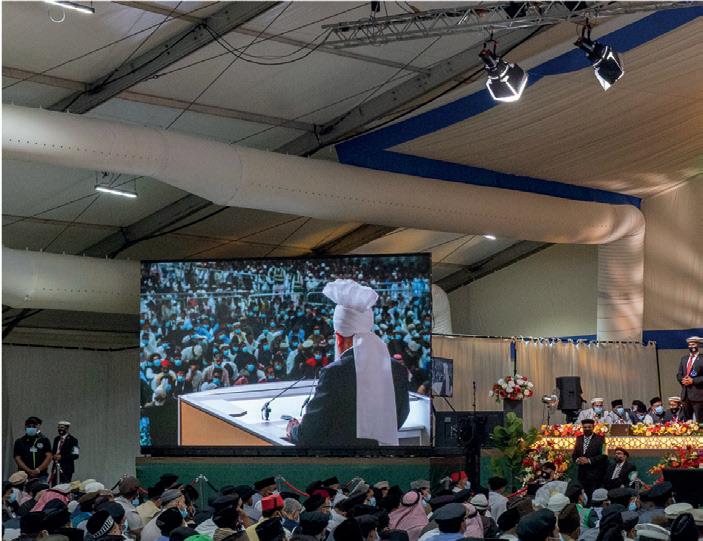
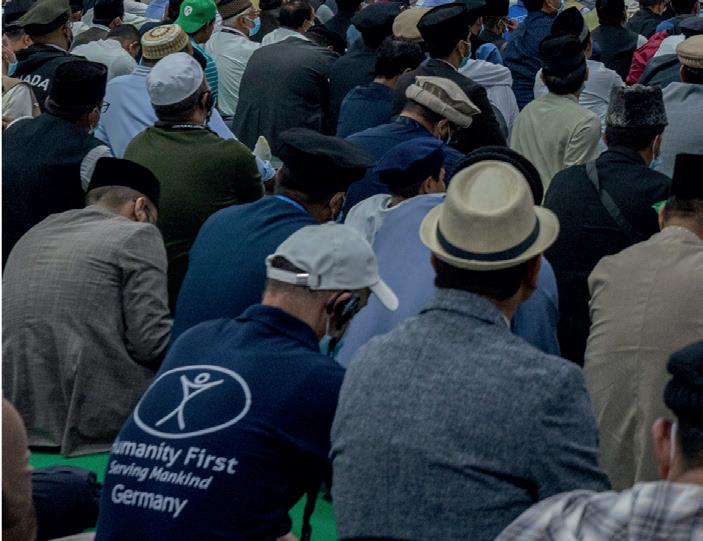
According to the circumstances, these due rights entail a few days of hospitality. It was the impact of this very guidance by the Holy Prophetsa which led the Companions to make sacrifices for the sake of hospitality. At that time in the early days, the Companions were not well off, nor would they easily find two meals in a day. The Companions, along with their wives and children, would remain hungry, forfeiting their own rights in order to show hospitality.
In this regard, there is a famous narration about the hospitality of a Companion: once, a guest visited the home of a Companion. He had been sent with that Companion by the Holy Prophetsa. When the Companion enquired, his wife told him that they only had a little bit of food at home that would be just enough for the children. However, for the sake of their guest, they distracted their children and coaxed them to sleep and brought the guest home. They put out the lantern and did not eat themselves either;

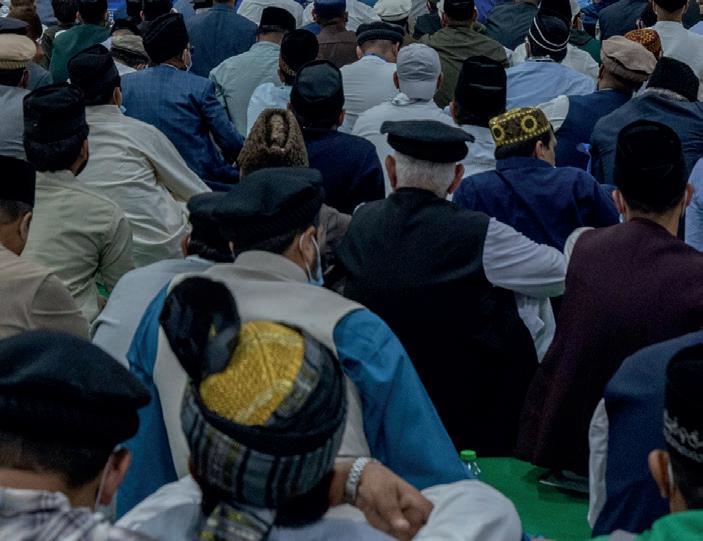
rather, they made it seem to their guest as if they were also eating. They went to sleep hungry, as did their children. Allah the Almighty was pleased, and He appreciated what they did so much that He also informed the Holy Prophetsa about it. The next morning, when that Companion went before the Holy Prophetsa, he said, “The way you fed your guest last night and the plan you came up with in order to do so greatly pleased Allah the Almighty and made Him laugh.” This is the standard of hospitality.
(Sahih Muslim, Kitab al-Ashribah, Bab Ikram al-Daif wa Fadl Itharah, Hadith 2054)
Hence, during these days, it is the responsibility of every volunteer, duty holder and officer of any department to serve in every way and be hospitable to the guests of the Promised Messiahas who are coming to attend the Jalsa. Especially during these days, you must work with effort, patience, and prayer. Even if a guest


says something harsh, you should exhibit lofty morals and overlook it for the sake of attaining the pleasure of Allah the Almighty. There are various departments here. During my previous sermon, I briefly mentioned that the officer of every department and those working under them should discharge their duties in an excellent manner and with good moral conduct.
There are many incidents of the Promised Messiahas in this regard. He used to especially advise about how to treat guests in an excellent manner. The Promised Messiah’sas instructions and incidents have been recorded in the books about his life in various manners at various instances. There is a famous incident about his hospitality towards guests who were visiting from Assam, showing how hospitable he was towards them. We hear this incident and are delighted by how the Promised Messiahas took care of them. However, it serves as
a lesson for all the volunteers, duty holders and indeed for all those who present themselves to serve the guests of the Promised Messiahas
The incident is narrated as follows: Once, there were some guests from Assam who came [to Qadian], and when they exited their ride and went into the Langar Khana, they asked the workers to unload their luggage. The attitude of the workers in the Langar Khana was not appropriate, due to which the guests became displeased and so they got back into the same horse carriage in which they had arrived and departed to go back. When the Promised Messiahas learned of this, he became very displeased at the fact that the guests had become unhappy and subsequently left. The Promised Messiahas immediately left his home in such a hurry that he had hardly put on his shoes and set out after them swiftly on foot. Though the guests were on a tanga – an Asian horse carriage –and had already covered some distance, the Promised Messiahas set out after them on foot, walking very fast. It is recorded that he reached them by the stream near Qadian. The Promised Messiahas stopped them and brought them back with him.
The manner in which he brought them back was also a unique display of honouring and respecting guests. He said to the guests, “Remain seated upon the horse carriage; I will walk alongside you.” Upon seeing his good conduct, the guests felt embarrassed and insisted that they could not continue the journey whilst sitting on the horse carriage and would instead walk with him. They kept insisting to the Promised Messiahas that they could not remain seated and that they would walk with him. In any case, they reached back to Qadian. At the Langar, the Promised Messiahas advanced to unload their luggage;
however, by now the workers had realised their mistake and were very ashamed, and so they immediately came forward and started to unload the luggage. Then, since the guests were from Assam, the Promised Messiahas made special arrangements for their food. (Taken from Sirat-ul-Mahdi by Hazrat Mirza Bashir Ahmadra MA, Vol. 4, pp. 56-57, Narration 1069)
Here, I wish to also clarify that with regards to the Langar Khana, the Promised Messiahas advised that whilst you should serve such guests, he also advised that during the Jalsa, one dish should be cooked to be served to all the guests, because there is a larger number of people, making it difficult to have separate arrangements. (Hazrat Sheikh Yaqub Ali Irfanira, Sirat Hazrat Masih-e-Maudas, p. 149)
Similarly, another example of hospitality has been narrated by Hazrat Mufti Muhammad Sadiq Sahibra. He says, “I remember that once, I was visiting Qadian from Lahore; this would have been in 1897 or 1898. The Promised Messiahas seated me in Masjid Mubarak, which at the time was a very small area. (The mosque was later expanded to make it larger). The Promised Messiahas said, ‘Sit here, I will bring you some food.’ He said this and then went inside.” Mufti Sahib says, “I thought that the Promised Messiahas would send a worker with some food, but when the window opened a few minutes later (there was a wall between the mosque and the Promised Messiah’sas house that had a window in it – a small door like a window) I saw the Promised Messiahas holding the tray of food himself and bringing the food for me. He looked at me and said, ‘Eat, I will bring water for you.’”
He says, “Upon witnessing this, tears involuntarily began flowing from my eyes. I thought to myself, ‘If the Promised Messiahas, our leader and guide, is performing such acts of service for us, how much more should we serve one another?’” (Zikr-e-Habib by Mufti Muhammad Sadiqra, p. 327)
This was an exemplary model, and there are numerous instances of such hospitality in the life of the Promised Messiahas. On one occasion, he advised his followers,
“I am always concerned with the fact that guests should never face any discomfort, and I always emphasise ensuring their utmost comfort. A guest’s heart is as delicate as a mirror, easily shattered by even the slightest distress.” (Malfuzat, 2022, Vol. 5, p. 111)
The Promised Messiahas further stated that some guests could be very emotional, much like the people from Assam, as I mentioned earlier. Different communities have their own ways and temperaments –some people become quickly emotional or even angry. The Promised Messiahas advised that one should not question why guests become emotional or angry. A guest’s heart is fragile, like glass or a mirror – it breaks easily. Hence, before causing them any distress or breaking their heart, one should take measures to protect them.
This is the example and guidance given by the Promised Messiahas in following his beloved Master (the Holy Prophetsa) for treating guests hospitably. It is narrated that once, when many guests had arrived, the Promised Messiahas instructed Mian Najmuddin, who was in charge of the Langar Khana, “See, there are many guests, some of whom you recognise and some whom you
do not. Therefore, it is best to treat everyone with equal respect and honour.” (Malfuzat, 2022, Vol. 5, p. 353)
All guests must be honoured, regardless of their financial status – whether they are wealthy or poor, coming from America, Pakistan, Africa, or elsewhere, or even locals. During these days, special care must be taken in this regard. All these guests have come at the invitation of Promised Messiahas to attend the Jalsa; thus, it is essential to respect, honour, and tend to their needs. How beautifully has the Promised Messiahas emphasised the importance of serving guests! He also told his workers that he had good faith in them and believed that they were properly caring for and serving the guests and would continue doing so.
Thus, every volunteer should strive in their respective departments to fulfil their responsibilities of hospitality owed to the guests, whether they are working in the dining marquees or elsewhere. As I mentioned before, various departments – from ticketing to bringing guests to the venue – interact directly with guests, and every volunteer must display courtesy and exemplary morals. There are the cooking and serving departments, and they too should duly fulfil their responsibility of hosting guests. These departments oversee a significant part of hospitality. Efforts should be made to ensure guests are served sufficient food in a respectful manner. Workers in the Langar Khana should strive to prepare high-quality food – and by Allah’s grace, they do make sincere efforts. It should be ensured that food is sufficient and does not run short.
The cleanliness departments must give special attention to maintaining cleanliness. Cleanliness is indeed part of faith, not something insignificant. The Holy Prophetsa taught that cleanliness is a part of faith. (Sahih Muslim, Kitab al-Taharah, Bab Fadl al-Wudu, Hadith 223)
Thus, special attention should be given to this. It encompasses maintaining cleanliness in the overall environment and other facilities, including bathrooms.
Volunteers guiding attendees to the Jalsa site for the various programmes should do so with kindness and gentleness. Some people might lack full awareness or fail to pay proper attention to the Jalsa proceedings. Discipline volunteers, both among men and women, should kindly and gently remind attendees. The Tarbiyat [moral training] Department is tasked with seating people appropriately to enable them to listen to the proceedings. The bazaar will be, and should be closed during the sessions to facilitate this purpose. Overall, volunteers everywhere should be mindful of showing extraordinary courtesy during these days so that they can fulfil positive expectations which the Promised Messiahas expressed. Similarly, I wish to address a few points to the guests. Although guests from outside the Community also attend, they have dedicated departments and receive special hospitality. However, apart from these few guests, the majority of attendees are Ahmadis. You have come to listen to the Jalsa proceedings, so do not overly concern yourselves with whether proper arrangements have been made for you or not, whether you have been given good hospitality or not, or be concerned with the behaviour of individual volunteers. Your primary goal is to gain
spiritual nourishment, which you should strive to attain. Though the hosts, as previously stated, must strive fully to fulfil their hospitality duties – and indeed, they do – attendees should also overlook any shortcomings or weaknesses they encounter. Those working in cleanliness are not professionals; the volunteers in the discipline department are not police officers; the volunteers at the gates are not professionally trained; and the traffic controllers are not police-trained personnel. Rather, they are all volunteers who have offered themselves to serve guests. Some of them are secondary school students, others university students, and many are established professionals in high-calibre professions and good positions, all serving voluntarily with the zeal to honour the guests of the Promised Messiahas
Therefore, appreciate their enthusiasm, fully cooperate with them, and overlook their shortcomings. Doing so will help you achieve the true objective for which you have come here and foster stronger interpersonal relations. Guests should always remember their purpose for attending the Jalsa, which can only be achieved by developing high morals and through the remembrance of Allah the Almighty.
In the dining marquees, it is the responsibility of every guest to promptly vacate the marquee after eating so others can have their turn. Occasionally, due to limited space and large numbers of attendees, meals have to be served in shifts. Therefore, make a conscious effort to vacate the marquees swiftly after finishing your meal, avoiding unnecessary conversations or lingering afterwards. You can go outside to have conversations and pass the time. Similarly, the volunteers pour food out onto plates. If you ask for more, then just as they have been instructed to, they will give you more food upon your asking. However, the food should not be wasted. One should always give value to food. There are some people who take the roti out and throw it away if it is just slightly overcooked or undercooked, whereas, wherever possible, if it is edible, then one should eat it, except if one is very ill and it could be harmful for them. Generally, the machines produce well-cooked rotis; I have checked this as well. However, sometimes there can be defective rotis. Unless a roti is very burnt or undercooked, avoid letting it go to waste. Similarly, do not let the curry go to waste. Not only would it be a waste of food, which should not happen, but that same food could have been given to someone else.
Another issue which arises is that it becomes very difficult to dispose of food that is left on the plates, and it places an increased burden on the cleanliness department, which greatly increases their workload. Hence, during the days of Jalsa, guests should eat the food whilst considering it to be a blessing and do not let it go to waste. The example of the Promised Messiahas was such that once, a meal could not be arranged for him; the organisers had forgotten, and he had also been occupied. When the Promised Messiahas asked if there was any food for him, everyone became worried because the food had run out. The Promised Messiahas said, “Not to worry, if there are any leftover pieces of pita bread and any curry on the tables where people were eating then bring that and I will eat
it.” Hence, the Promised Messiahas ate the broken pieces of pita bread which others had left. (Sirat Hazrat Masih-e-Maudas by Yaqub Ali Irfani Sahibra, p. 322)
This was the excellent example that he established for us. Hence, always remain mindful that we must avoid letting any food go to waste, and thereby, we must also create ease for those tasked with cleaning up. The Holy Prophetsa instructed not to waste food. (Sunan at-Tirmidhi, Kitab al-At’imah, Bab Ma Ja’a fi al-Luqmah Tasqut, Hadith 1803; Sunan Ibn Majah, Kitab al-At’imah, Bab alNahyi an Ilqa’ al-Ta’am, Hadith 3353)
Food should be valued and eaten, and whatever is presented should be eaten happily. This instruction is undoubtedly directed towards guests specifically, and so, those guests who act upon this bring blessings with them. However, to realise those blessings, every guest must set their own example.
Be those guests who bring blessings with them, not those guests who create uneasiness for their hosts; rather, you should bring about ease for their hosts. We have come here, where under the Jalsa there is an organisational structure and volunteers are discharging their duties. However, all Ahmadi attendees and workers alike, indeed all of us Ahmadis, have a unified purpose; to achieve moral, spiritual and intellectual reformation in light of the Promised Messiah’sas teachings and the teachings of Islam. Whether those on duty or guests, this is a duty shared by everyone, and so we must strive towards this.
Sometimes, there are circumstances where there is a shortage in food. The workers and the Langar Khana do strive to ensure that there is no shortage in food; however, sometimes with large gatherings, it is possible to make inaccurate estimates, leading to shortages. In this regard, we should always remember the guidance of the Holy Prophetsa; he said that the food for two people can suffice for three, and the food for three people can suffice for four. (Sahih Muslim, Kitab al-Ashribah, Bab Fadilah Muwasah fi al-Ta’am al-Qalil […], Hadith 2058)
In another narration, it is stated that the food for one person is enough for two people, and the food for two people is enough for four people, and the food for four people is enough for eight people. (Sahih Muslim, Kitab al-Ashribah, Bab Fadilah Muwasah fi al-Ta’am al-Qalil […], Hadith 2059)
Hence, we should always bear this in mind.
Another thing which I have mentioned before as well is that we should create ease for those who are on duty. Be mindful of cleanliness in the food marquee and other areas as well. Remain mindful of creating ease when it comes to cleanliness as well. Be careful not to throw garbage on the roads or pathways. Wherever you may sit to eat and drink; some people buy things to eat from the bazaar and rather than throwing the empty packets and bags here and there they should throw them in the dust bins in order to create ease for the cleanliness workers and so that more work can be done in less time enabling the organisation to run smoothly. Then, there should be an all-around display of lofty moral conduct. I have already said this to the workers, and the guests should also display lofty moral conduct. It is recorded in a Hadith that the Holy Prophetsa
said that those who believe in Allah and the Last Day should say something nice or remain silent. (Sahih Muslim, Kitab alIman, Bab al-Hath ala Ikram al-Jar wa alDaif…, Hadith 47)
Hence, if there is a scenario which could lead to anger, rather than expressing anger and a display of ill morals, one should remain silent and seek forgiveness from Allah and recite prayers.
I also wish to say that care should be taken when it comes to children’s food. Sometimes people give children full plates of food, whereas the children cannot eat that much, which then causes the food to be wasted. As I mentioned earlier, avoid wasting food and pour food for children in smaller amounts, even if it means constantly pouring food for them.
Always remember that you must fulfil the objective of the Jalsa, and strive to reap and collect all the blessings associated with the Jalsa; the very blessings for which the Promised Messiahas initiated this Jalsa. On one occasion, the Promised Messiahas said that one should attend the Jalsa and listen to it with attention. One should not simply observe the speeches or look for what is good and what is bad; rather, they should consider that whatever is being spoken about is in accordance with the commandments of Allah and the Holy Prophetsa, which we must strive to implement, rather than simply who is speaking and their style of speaking. The Promised Messiahas states:
“Would all the gentlemen listen attentively! I wish and desire for my community, and even for my own person and soul, that we must not be pleased with empty words and expressions that are to be found in lectures. Our entire aim and focus must not culminate merely in the spellbinding nature of a certain individual’s speech and the power of their words. This does not please me. What pleases me –and not by any pretence or affectation, but rather as a natural and inherent demand of my soul – is that everything be done for the sake of Allah and to serve God.” (Malfuzat [English], Vol. 2, p. 113)
Then, the Promised Messiahas states that the very reason for the decline of Muslims has become the fact that they hold large conferences and councils; they have gatherings where renowned speakers and linguistic lecturers deliver their lectures. Poets recite poetry about their nations, and people raise slogans for this, yet it leaves no lasting impact. The nation then falls into decline as a result of those slogans alone. (Taken from Malfuzat, 2022, Vol. 1, p. 362)
Hence, this is the teaching and the standard of sincerity which every person, every Ahmadi, must bear in mind; we should not listen to what is being said merely for the sake of raising slogans or for our own preference; rather, we must listen to these things in order to implement them for the sake of Allah and the Holy Prophetsa. This is the very purpose for which an Ahmadi should come here; the very purpose for which you are here. I trust that this is the purpose for which you have come. As the Promised Messiahas said, everything should be done for the sake of Allah the Almighty, and whatever is said should be for the sake
of God. Everyone should bear this principle in mind.
Also, remember that we should spend our days whilst engaged in the remembrance of Allah. Even whilst listening to the Jalsa, you should remain engaged in the remembrance of Allah. Afterwards, as you walk around and meet people and speak to them, these conversations should be rooted solely in the faith. They should be conversations about the remembrance of Allah the Almighty, about the Quran, Hadith and fulfilling the objectives of the Promised Messiahas. These conversations should draw towards the remembrance of Allah the Almighty and praying for the faith. It is the remembrance of Allah alone that can also purify one’s thoughts, making them the recipients of Allah the Almighty’s bounties.
At one instance, Hazrat Musleh-eMaudra beautifully states that Allah the Almighty says to remember Allah and to especially do so in gatherings. What has Allah the Almighty said about the benefit of doing this? Allah the Almighty says that the benefit of doing this is that:
Meaning if you remember Allah, then He will start to remember you. Once God remembers someone, then who can be more fortunate than the one who is remembered and called upon by his Master? The remembrance of Allah is a great blessing. He further advises and says that whether you receive a reward or not, remain engaged in the remembrance of Allah, for it will please Allah the Almighty, and then He will remember you. (Taken from Khutbate-Mahmud, Vol. 4, p. 258, Friday Sermon delivered on 25 December 1914)
When Allah the Almighty remembers someone, it cannot be that He does not bless them. He certainly bestows His blessings. Hence, in order to draw the special blessings of Allah the Almighty, especially remember these things during these days and pay attention to them. Those participating in these special days and the workers should all remain mindful of the fact that they must always remain engaged in the remembrance of Allah. When they do so, it will result in bringing about the very atmosphere for which this Jalsa is held. On one occasion, the Promised Messiahas said:
“Everyone ought to listen attentively, with careful consideration and deep thought, because this is a matter of faith. Negligence, indolence, and a lack of care result in extremely ill consequences. Those who are negligent in faith and those who, when they are addressed, do not listen carefully, fail to derive any benefit whatsoever, no matter how immensely beneficial and effective the words of the speaker may be. It is these people about whom it is said that they possess ears, but hear not; they possess hearts, but fail to understand. Hence, bear well in mind that you must listen attentively and with deep reflection to whatever is presented before you. For the one who does not listen carefully, cannot receive any benefit even if they remain in the company of a beneficial person for a lengthy period of time.” (Malfuzat [English], Vol. 4, p. 213)
These three days can only prove
beneficial if we attentively listen to what is said and then vow to act upon those things. In order to achieve this, in order to keep our hearts purified, we must keep ourselves busy in the remembrance of Allah. Whilst attending the Jalsa, continuously engage in the remembrance of Allah, in prayers, and in reciting durood [prayer for sending salutations upon the Holy Prophetsa]; then when you listen to the speeches, they will have a profound impact on you.
The Promised Messiahas has expressed great concern in this regard: that if you do not attentively listen to the Jalsa proceedings, then there is no real benefit to you attending the Jalsa. We must especially remember that our purpose here is to reform ourselves, to increase our religious knowledge, and to better our spiritual condition – and for this reason, we must strive to our utmost. We must improve our condition with respect to our etiquette and must foster the spirit of sacrifice when it comes to our friends and brothers. And we must rid our hearts of any ill will; this is also an important objective [of Jalsa].
This atmosphere that has been created, within which many thousands of people have gathered, is one in which – if we treat one another with the spirit of brotherhood and love – such an environment and such conditions will be fostered within which love, affection, brotherhood, and camaraderie will be borne, which are the fundamentals of Islamic teachings. And it is by bringing these things into practice that one can become honoured in the sight of Allah the Almighty, and receive His blessings. In many of his speeches, the Promised Messiahas drew attention towards the fact that a great purpose of attending the Jalsa is inculcating high morals and that such high morals should be on display in every direction. Sometimes, resentment or a disagreement ensues from extremely small matters to the extent that volunteers sometimes fight with one another. This should never happen. The greatest etiquette should always be on display. Thus, both the volunteers and the guests should remember that their etiquette should always be of a high standard, and they should constantly pray to be protected from every evil.
Similarly, I wish to address some other matters regarding Jalsa. Firstly, wherever you are staying during the days of Jalsa – be it in mosques, in particular Baitul Futuh and Masjid Fazal in London, or in Islamabad, or here [at the Jalsa site] – take care of your neighbours and also display the highest morals. Abide by the rules of the road. Sometimes there is more traffic due to the rush, so do not throw any sort of rubbish in front of other people’s houses.
I wish to address the women and say that specific marquees have been allotted for women with children; these women should stay in the children’s marquees without any complaint and should strive not to create any noise. Sometimes it so happens that the children are actually making less noise, but the women think that because they are in these marquees, it is permitted for them to speak to one another. They should refrain from speaking, focus on the speeches, and carefully listen to the programme. When
they display their own example, then the children will also quietly listen. There are some women who, by Allah’s grace, tend to their children’s moral training in this way, or they give something to the child in order to distract them and to keep them occupied, and the mothers are able to easily listen to the programme. But there are also some who keep speaking to one another. The administration complains about this. There should never be a need for such complaints. And when they are told to stop, they express their displeasure, even though the blame lies on both of them. If a volunteer has spoken harshly, then the guest also replies harshly and exacerbates the matter. This is why one should strive not to cause an issue from either side; rather, an environment of love and affection should be created.
Similarly, all arrangements have been made, including parking and at the gates. The guests should cooperate with the volunteers so that all the arrangements run easily and smoothly. Furthermore, the guests should keep an eye on their surroundings, and if they see something suspicious, they should report it immediately. By keeping an eye on one another, any miscreant or one who wishes to create mischief will refrain from doing so or will be hesitant and will not find the courage to create such mischief. Thus, every attendee should remember that they must also guard their surroundings and must keep watch in order to protect them. There is also the discipline department; everyone should also fully cooperate with them. Always keep ID cards with you and get them checked. Those who are staying in various places should try not to leave any expensive belongings there when coming here. There are certainly security arrangements, but you should still bring your valuables, such as money, etc., with you to avoid any risk of loss.
May Allah the Almighty enable you all to greatly benefit from this Jalsa. May you benefit from its blessings, and when you depart from here, may you depart with your bundles, which have collected the bounties of Allah the Almighty. May you return having been blessed with the bounties of Allah the Almighty. May Allah the Almighty continue to bestow blessings upon you and your future generations. May you always live your lives in this world whilst being of useful service to Ahmadiyyat. Similarly, may your future generations always live their lives in this world whilst being pure and useful people, and may Allah enable this to continue until the day of judgement.
Finally, I should also mention that, similar to previous years, various departments have exhibitions, which are excellent educational, enlightening, and interesting resources. Try to visit these as well. All the exhibitions are in one area. Similarly, there are new books at the book stall, so visit this as well. Do not merely stroll about or buy things in the bazaar; rather, you should also strive to benefit from this spiritual nourishment. May Allah enable you all to do so.
(Official Urdu transcript published in the Daily Al Fazl International, 15 August 2025, pp. 2-6. Translated by The Review of Religions.)
